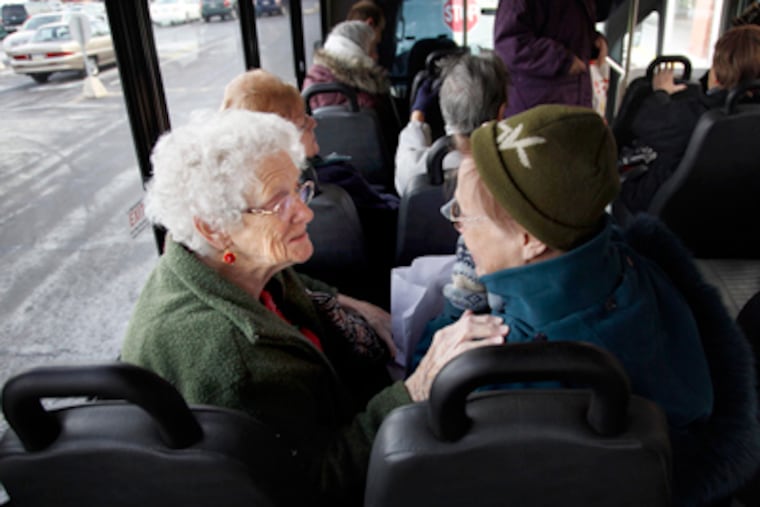Older Abington residents face loss of much-used bus service
With a load of groceries under her arm, Helena Tantanaiewski boards the Abington Transit Bus for what she expects will be one of her last rides. As usual, the cabin explodes in a flurry of greetings.

With a load of groceries under her arm, Helena Tantanaiewski boards the Abington Transit Bus for what she expects will be one of her last rides. As usual, the cabin explodes in a flurry of greetings.
"Oh, my," one silver-haired passenger exclaims. "You got your hair done."
"It's been awhile," shouts another as Tantanaiewski and her daughter, Ruth, take their seats.
For more than a decade, mother and daughter have taken the same ride on the same bus with the same fellow passengers several times a week - each trip bringing the same warm welcome.
Come the end of this month, all that will change.
Abington is preparing to shut down its bus program for elderly residents on Dec. 29, citing years of declining ridership and a tight 2011 budget. The decision will halt one of Pennsylvania's last fixed-route municipal transportation services tailored for seniors.
For many older Abingtonians, that means seeking alternate transportation and coping with significant restrictions to their daily mobility. For Ruth Tantanaiewski and her mother, though, the end of the Abington Transit Bus also imperils friendships built over years.
"It's not just a bus ride," she said. "It's a family."
The bus' 20 to 25 regular passengers have taken the news with varying degrees of acceptance. On a recent morning, the packed passenger cabin was abuzz with questions over what would come next.
Stella Markowitz, who boarded the bus on her way to fill a prescription, was indignant that the township could close a service upon which she relies so heavily.
"I don't drive. I have two artificial hips. I'm full of arthritis," she said. "We're not out here joy-riding. If we had other forms of transportation, we'd take them."
Sitting nearby, Shirley Stetser chimed in, suggesting that she, like many of the riders, would be willing to pay a fee to keep the service going.
This month, more than 100 residents of the Redeemer Village senior housing center signed a petition asking Abington commissioners to keep the bus running. But the number of signatures far exceeded the number of riders the bus carries on a day-to-day basis, Township Manager Burton Conway said. Since 2004, the passenger load has declined by 64 percent - from 8,041 trips per year then to 2,845 last year.
And since funding for the program - received from the state lottery - is based upon annual ridership, the township decided it could no longer justify the expense, Conway said. The money received this year fell far short of what was needed to renew the $75,000 contract.
Still, the township - one of a handful of municipalities across the state that established similar transit programs for seniors in the early 1990s - hung on as long as it could, outlasting a fixed-route senior bus service in Cheltenham that shut down last year, and cutbacks in service to similar programs in Conshohocken and Upper Merion.
"There's now a huge gap in funding that would otherwise have to be picked up by the Abington taxpayers," Conway said.
He announced the decision this month in a letter handed out to all passengers. Apologizing for the inconvenience, he advised riders to take advantage of other transit programs, such as SEPTA's free senior fares and door-to-door, charge-by-the-trip shuttle services available by appointment.
But those options come with limitations for passengers such as Norma Sears. Using a wheelchair and suffering from advanced multiple sclerosis, she's found most of the senior transit services aren't equipped to handle her disabilities. Some lack wheelchair access.
Plus, having to schedule and pay for each trip on her monthly fixed income will make her think twice before stepping out for a quick trip to the grocery store or to visit a friend across town, she said.
"An inconvenience would be if they shut down the bus for two or three weeks," she said. "To not have it at all is a change of lifestyle."
Even bus driver Don Carter, who said he can see both sides of the issue, said he worries about what will happen to the dedicated busload of seniors he shuttles across the township four times a day, three days a week, for doctor appointments, shopping trips, and prescription runs.
Along the way, Carter checks in on their health, asks about their grandchildren, and helps the more frail climb on and off.
"I look out for them. I make them feel safe," he said. "Wouldn't you feel good if you knew someone was out there taking care of your mom?"
During his year of driving the route, the passengers have also taken care of Carter. Some months ago, he had to put down his family's pit bull, Queen Latifah. Carter said he came to work distracted and dejected.
When one of his regulars boarded that morning, she leaned over, wrapped her arms around him, and gave him a hug.
She also slipped him a candy bar - because Carter looked like he needed it.
"That candy bar was like winning the Powerball," he said, telling the story over his shoulder as he wraps up one of the last winding routes of the Abington Transit Bus. "I love these ladies. They love me. It's been a blessing."